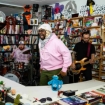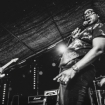"I won't lie, talking to Revolver is definitely something I imagined when I was supposed to be paying attention in algebra," Pierce Jordan says, laughing. At 29, Jordan is quite a few years beyond his classroom zone outs. But he feels compelled to highlight this full-circle moment — confessing that much of his heavy-music knowledge can be traced back to devouring the pages of Revolver, after he spotted his heroes System of a Down on the front cover in the grocery store.
Jordan is here now because he fronts Philadelphia-based Soul Glo, one of the most invigorating bands tearing up today's heavy-music scene. The trio, in which Jordan is joined by bassist GG Guerra and drummer TJ Stevenson, could be described as hardcore, screamo, powerviolence, punk-rap or noise-rap — whatever you call it, they shred. They're prolific, too: In addition to their prior LPs, 2016's UNTITLED LP and 2019's The Nigga in Me Is Me, they released an awesome EP, Songs to Yeet at the Sun, in 2020, and two volumes of the DisNigga EP in 2021. Earlier this year, they released their best album yet, Diaspora Problems. Jordan was recently named one of the best frontpeople in modern rock by the AV Club, and it's obvious why. His lyrics — whether they're delivering explosive radical politics, calling out white punk hypocrisy, or exploring his path to recovery from trauma — are unforgettable, and they're delivered with speed, potency and personality that few can emulate.
Jordan was raised on funk and jazz fusion thanks to his father. To this he attributes a natural affinity for intense, hectic music. "It [spoke] to my anxiety, maybe," he suggests. He and his older sister discovered metal together through System of a Down, and from there he developed a love for post-hardcore, especially screamo innovators Circle Takes the Square.
This link between genres is core to Soul Glo's philosophy, as they meld hardcore with hip-hop uncompromisingly and seamlessly — allowing them to fit on a bill alongside Armand Hammer as easily as with Touché Amoré. As Jordan explains, this is a natural combination to him, because the genres come from a common root of Black music that has been lost over the years of assimilation. "As Black art becomes more accepted and standardized, it gets colonized," he says. "Rap is on its way. It happened to rock and jazz. We're the No. 1 content creators of the Western music market, but we do not have any control over the production or the profit. As long as capitalism and our white supremacist worldwide society exists, it's gonna happen with everything that Black people created."
He continues, "What's funny to me is that we are considered and count ourselves lucky to be able to [play alongside various artists], but simultaneously, not to sound arrogant, but we should be able to do whatever we want, because all of these forms are the traditions that we come from already. It feels like something that shouldn't be counted as special. All this shit is just the way that I wanna go through life, but then suddenly I'm [considered] a groundbreaking artist, just because I have the same tastes that so many people around me have."
When Soul Glo began, Jordan's only intention was to "go hard emotionally," he says. "I was like, I just wanna write about my shit, in a way that only I can. And just to talk about Black shit, basically. I find that the band has really been shaped around just putting into our music what we've been through as people." He takes pride in workshopping his lyrics, including at a poetry group run by a friend in Philadelphia. On Diaspora Problems, we hear him delivering some truly rousing condemnations of the United States on "Fucked Up If True" and "We Wants Revenge." Meanwhile, he also digs deeper than ever into his personal past and present, exploring his attempts to regain self-love in the wake of a traumatic relationship on "(Five Years and) My Family" and "The Thangs I Carry."
"That process of finding new ways to live through trauma and heal from it, I just feel like is any adult person's responsibility to do, so that they don't become a danger to people around them," he says. "Music and writing as my outlet is just what I feel like I'm supposed to do. I feel like the reason why people harm each other and themselves is because they don't have a place or a way to express themselves, and feel heard. I've had that issue in a lot of relationships in my life, where I've come away feeling unheard or misunderstood. So that definitely plays a part in my writing."
Learning to self-express has been a long and crucial journey, Jordan goes on to explain. "I have memories as a teen of wanting to talk to my parents about certain things that I was going through, and physically feeling my throat close. I remember one time, my friend had just died, and my dad was just trying to get me to say anything. But I didn't feel like I could just be like, 'I feel insane, and I feel so angry and confused.' I felt like I'd just swallowed a piece of charcoal."
He continues, "I had a lot of friendships growing up that helped me with practicing that vulnerability, especially after my friend died. People I was playing music with in high school, just through the intimacy of playing music together, and doing some of our first drugs together and things like that. And then just the older I got, seeing some of the choices that I could make as a young man based off how I'm seeing other people act, and people around me talking about how they wanna see specifically men change so that the world cannot be such a shit place. I was just thinking about, What kind of person do I wanna be? And it's only through continually having the hard conversations when they need to be had, that's what keeps us on the path of emotional reconstruction. It might be hard, but I still have to do it."
On a personal level, it's been gratifying for Jordan to see support from his family, particularly his dad. "He has specifically encouraged other members of my family to read my writing in this band, and that is deeply meaningful," he says. On a much wider level, too, it's clear that Soul Glo have spoken to something visceral in people, even outside of DIY punk circles. Diaspora Problems has been praised by Pitchfork and The Guardian, and they've been announced as support for a North Carolina arena show with My Chemical Romance. "As far as I'm concerned, that show is just a figment of my imagination," says Jordan, "and everybody around me is apparently joining in on it." He laughs.
Even as they get in front of more people, though, Jordan has no fear of sacrificing authenticity. "When Beyoncé put out Lemonade, the conversation that that created socially, everybody was participating in when it came out. And she is the most famous artist in the world," he says. "So I don't think it really matters what kind of music [important messages] are coming from, it matters who's saying what and when. As Kurt Cobain was famously quoted as having said: As long as it's good and it has passion. Like, I feel like it's as simple as that. Is it real or not?"








